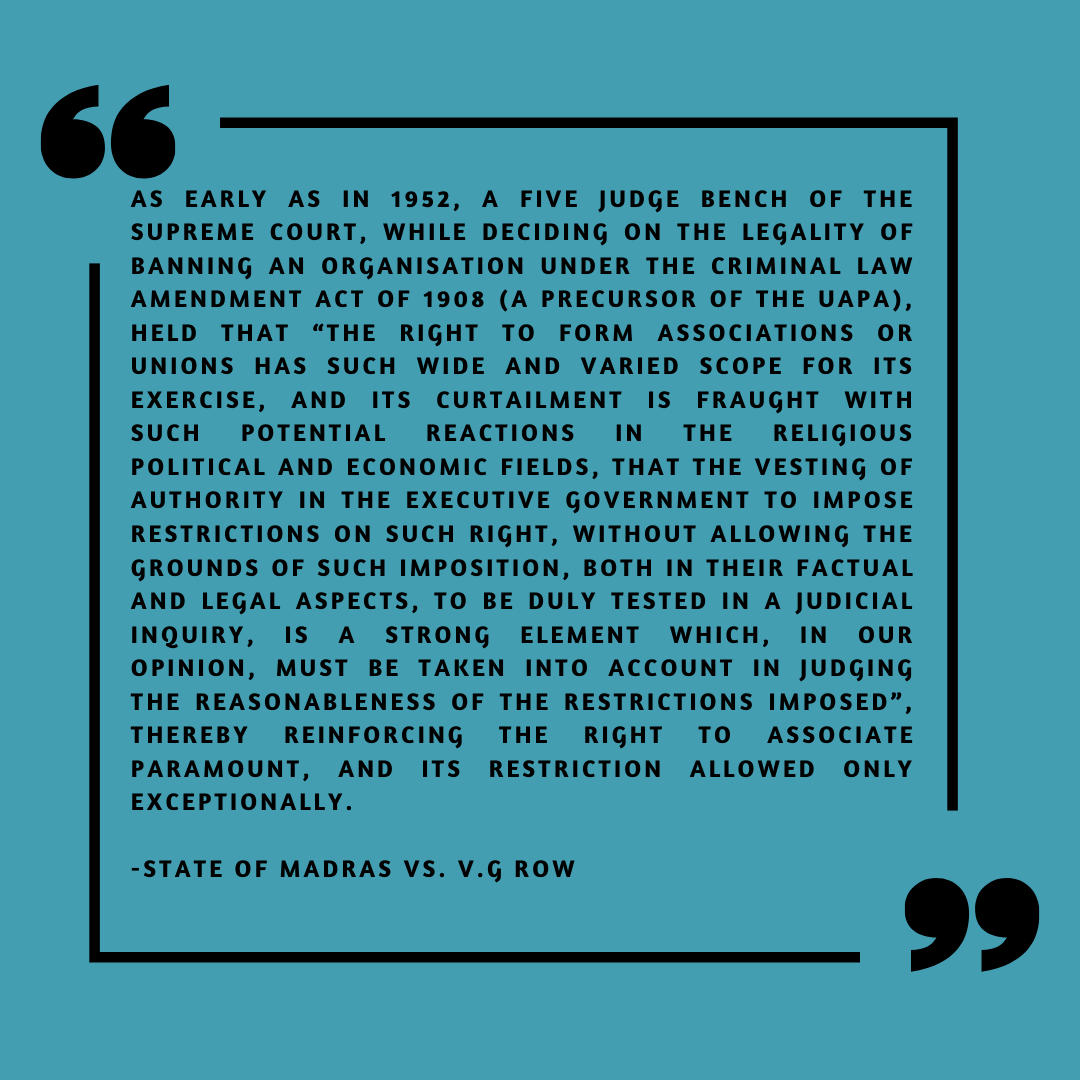Hello, we are @guneetkaurahuja and @aimanjkhan, today we will look at the arbitrariness of the process of banning organizations under UAPA. That discussion will be curated based on notes and research done by Advocate Sahana Manjesh. 1/n
The UAPA allows for associations (defined to be any body or combination of persons) to be declared as “unlawful associations” 2/n
An association can be declared to be an unlawful association and banned only after following due process of law which include the following- 3/n
(1) Central Government has to issue a notification in the Official Gazette, declaring an association to be unlawful. 4/n
(2) Such a notification must specify the grounds on which an association is being declared unlawful. However, the Central Government is not required to disclose any fact which it considers to be against the public interest. 5/n
(3) This notification will not come into effect until a UAPA Tribunal passes an order confirming the declaration by the Central Government. 6/n
(4) The reference to a UAPA Tribunal must be made within a month of issuing the notification, and the UAPA Tribunal is required to come to a decision within 6 months from the time of this reference.. 7/n
..The concerned association is given the opportunity to defend itself before this Tribunal. 8/n
If the circumstances require, the notification declaring an association to be unlawful can come into force immediately, but only after stating reasons for such an immediate ban, in writing. 9/n
The Supreme Court has held that the grounds which form the basis of the declaration of an unlawful association cannot be the same grounds for enforcing the declaration with immediate effect – special reasons have to be given for this. 10/n
However this is a route often opted by the government, requiring the association to seek legal recourse to challenge this. 11/n
The UAPA Tribunal consists of a sitting judge of a High Court. Both the Central Government and the concerned association make representations before the Tribunal. The government files what is known as a ‘background note’, with details of activities of the association...12/n
..This could include newspaper reports, pending/decided criminal trials, and depositions by the public, etc. 13/n
The contesting association then has the opportunity to rebut these claims, cross-examine government witnesses, and lead its own evidence as to the nature of activities undertaken by it. 14/n
It is important to note that material which forms the basis of the ban must be facts, and not mere opinions of the government. 15/n
The UAPA Tribunal is required to follow the procedure under Code of Civil Procedure (the law that governs civil legal proceedings), & rules under Indian Evidence Act (the principles for admissibility and appreciation of evidence for both criminal & civil legal proceedings).16/n
Given the leeway provided in the UAPA, & how the Supreme Court has previously decided, the Tribunal has power to formulate its own principles for the proceedings & for collecting & appreciating evidence where required. But, the principles of natural justice must be followed. 17/n
The UAPA Rules allow for confidential material to be produced before the Tribunal, to be seen only by the Tribunal and the contesting association – however, the rules also allow for the Central Government to not disclose facts if this can compromise national security. 18/n
Such an exception has the possibility of subverting due process safeguards before banning an organisation. 19/n
Once the Tribunal passes an order approving the declaration of an association as being unlawful, this remains in force for a period of five years, after which the Central Government will have to issue a fresh notice in case it wishes to retain the ban. 20/n
However, before the expiry of the five years, the association can challenge the ban.The importance of having a rigorous due process before the declaration of an association to be unlawful is a constitutional requirement. 21/n
Article 19(1)(c) of the Constitution recognises the right to form associations & unions, a right that can only be restricted in the interests of the sovereignty & integrity of India or public order or morality, as provided under Article 19(4) of the Constitution. 22/n
Once associations are declared unlawful, there are two things this allows for, apart from making the functioning of the association impossible – 23/n
(1) having persons booked under the UAPA for being members of such associations and (2) declaring other organisations to be ‘frontal organisations’ of these unlawful associations, without having to go through a separate process for having them declared as unlawful. 24/n
As the law stands, the Supreme Court has held that mere membership is not sufficient for successful prosecution under the UAPA, one must have taken active participation in the alleged unlawful activities for which the association has attracted a ban. 25/n
Declaration as a terrorist organisation has a different process from the declaration of unlawful association- in the case of a terrorist organisation, the Central Government passes a notification in the Official Gazette including an organisation under Schedule I of the UAPA. 26/n
Schedule I of the UAPA lists terrorist organisations and there is no need for this to be approved by a Tribunal. However, such an organisation can seek redress before a Review Committee. 27/n

 Read on Twitter
Read on Twitter




